Research on Eco-Friendly Practices for Sustainable Australian Events
VerifiedAdded on 2022/09/02
|5
|1633
|40
Report
AI Summary
This report presents a comprehensive literature review assessing the impact of adopting eco-friendly concepts within the Australian events industry to achieve environmental sustainability. The research addresses the primary question of how eco-friendly concepts influence the adoption of sustainability in Australian events, supported by sub-questions exploring eco-friendly concepts' influence on businesses and the definition of sustainability within the Australian event context. The review delves into the significance of eco-friendly practices, including the use of non-toxic materials, sustainable sourcing, and waste reduction strategies. It highlights the growing trend of sustainable event planning and the importance of minimizing environmental footprints. The influence of eco-friendly concepts is examined through initiatives such as going paperless, optimizing transportation and venue selection, and promoting sustainable food and beverage choices. The review also emphasizes the importance of recycling and waste management to ensure the long-term sustainability of event venues. The research draws on various academic sources to provide a detailed analysis of the subject.
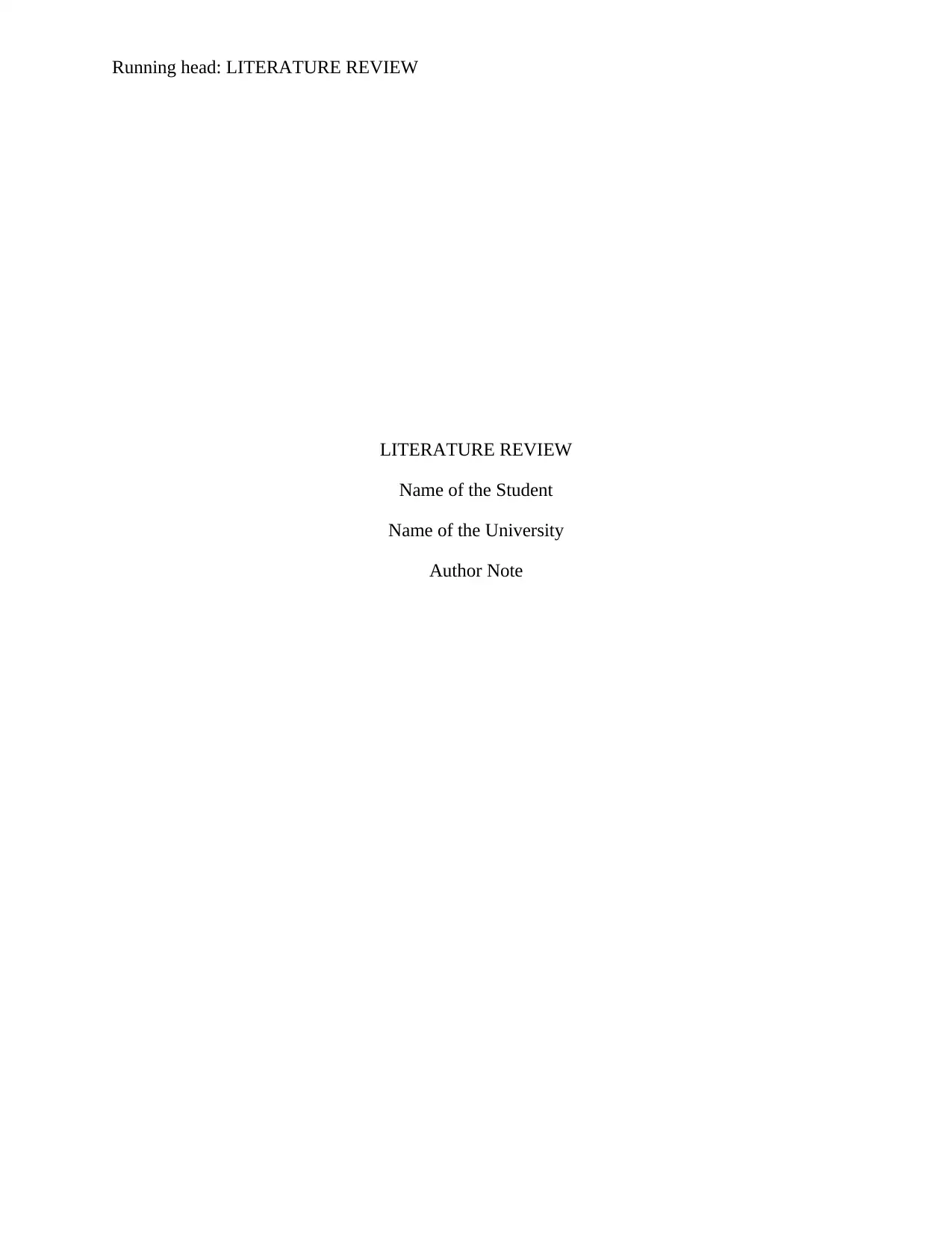
Running head: LITERATURE REVIEW
LITERATURE REVIEW
Name of the Student
Name of the University
Author Note
LITERATURE REVIEW
Name of the Student
Name of the University
Author Note
Paraphrase This Document
Need a fresh take? Get an instant paraphrase of this document with our AI Paraphraser
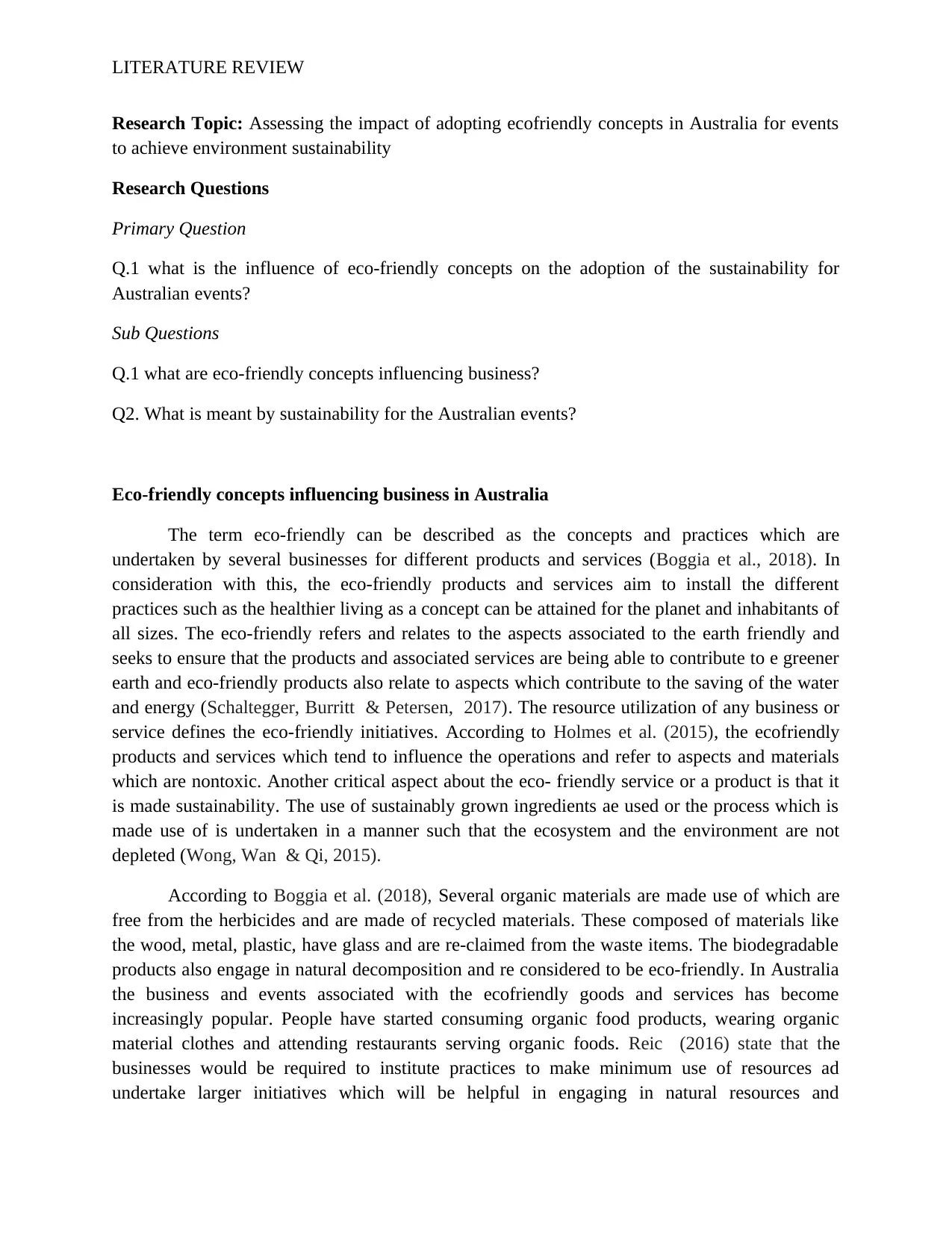
LITERATURE REVIEW
Research Topic: Assessing the impact of adopting ecofriendly concepts in Australia for events
to achieve environment sustainability
Research Questions
Primary Question
Q.1 what is the influence of eco-friendly concepts on the adoption of the sustainability for
Australian events?
Sub Questions
Q.1 what are eco-friendly concepts influencing business?
Q2. What is meant by sustainability for the Australian events?
Eco-friendly concepts influencing business in Australia
The term eco-friendly can be described as the concepts and practices which are
undertaken by several businesses for different products and services (Boggia et al., 2018). In
consideration with this, the eco-friendly products and services aim to install the different
practices such as the healthier living as a concept can be attained for the planet and inhabitants of
all sizes. The eco-friendly refers and relates to the aspects associated to the earth friendly and
seeks to ensure that the products and associated services are being able to contribute to e greener
earth and eco-friendly products also relate to aspects which contribute to the saving of the water
and energy (Schaltegger, Burritt & Petersen, 2017). The resource utilization of any business or
service defines the eco-friendly initiatives. According to Holmes et al. (2015), the ecofriendly
products and services which tend to influence the operations and refer to aspects and materials
which are nontoxic. Another critical aspect about the eco- friendly service or a product is that it
is made sustainability. The use of sustainably grown ingredients ae used or the process which is
made use of is undertaken in a manner such that the ecosystem and the environment are not
depleted (Wong, Wan & Qi, 2015).
According to Boggia et al. (2018), Several organic materials are made use of which are
free from the herbicides and are made of recycled materials. These composed of materials like
the wood, metal, plastic, have glass and are re-claimed from the waste items. The biodegradable
products also engage in natural decomposition and re considered to be eco-friendly. In Australia
the business and events associated with the ecofriendly goods and services has become
increasingly popular. People have started consuming organic food products, wearing organic
material clothes and attending restaurants serving organic foods. Reic (2016) state that the
businesses would be required to institute practices to make minimum use of resources ad
undertake larger initiatives which will be helpful in engaging in natural resources and
Research Topic: Assessing the impact of adopting ecofriendly concepts in Australia for events
to achieve environment sustainability
Research Questions
Primary Question
Q.1 what is the influence of eco-friendly concepts on the adoption of the sustainability for
Australian events?
Sub Questions
Q.1 what are eco-friendly concepts influencing business?
Q2. What is meant by sustainability for the Australian events?
Eco-friendly concepts influencing business in Australia
The term eco-friendly can be described as the concepts and practices which are
undertaken by several businesses for different products and services (Boggia et al., 2018). In
consideration with this, the eco-friendly products and services aim to install the different
practices such as the healthier living as a concept can be attained for the planet and inhabitants of
all sizes. The eco-friendly refers and relates to the aspects associated to the earth friendly and
seeks to ensure that the products and associated services are being able to contribute to e greener
earth and eco-friendly products also relate to aspects which contribute to the saving of the water
and energy (Schaltegger, Burritt & Petersen, 2017). The resource utilization of any business or
service defines the eco-friendly initiatives. According to Holmes et al. (2015), the ecofriendly
products and services which tend to influence the operations and refer to aspects and materials
which are nontoxic. Another critical aspect about the eco- friendly service or a product is that it
is made sustainability. The use of sustainably grown ingredients ae used or the process which is
made use of is undertaken in a manner such that the ecosystem and the environment are not
depleted (Wong, Wan & Qi, 2015).
According to Boggia et al. (2018), Several organic materials are made use of which are
free from the herbicides and are made of recycled materials. These composed of materials like
the wood, metal, plastic, have glass and are re-claimed from the waste items. The biodegradable
products also engage in natural decomposition and re considered to be eco-friendly. In Australia
the business and events associated with the ecofriendly goods and services has become
increasingly popular. People have started consuming organic food products, wearing organic
material clothes and attending restaurants serving organic foods. Reic (2016) state that the
businesses would be required to institute practices to make minimum use of resources ad
undertake larger initiatives which will be helpful in engaging in natural resources and
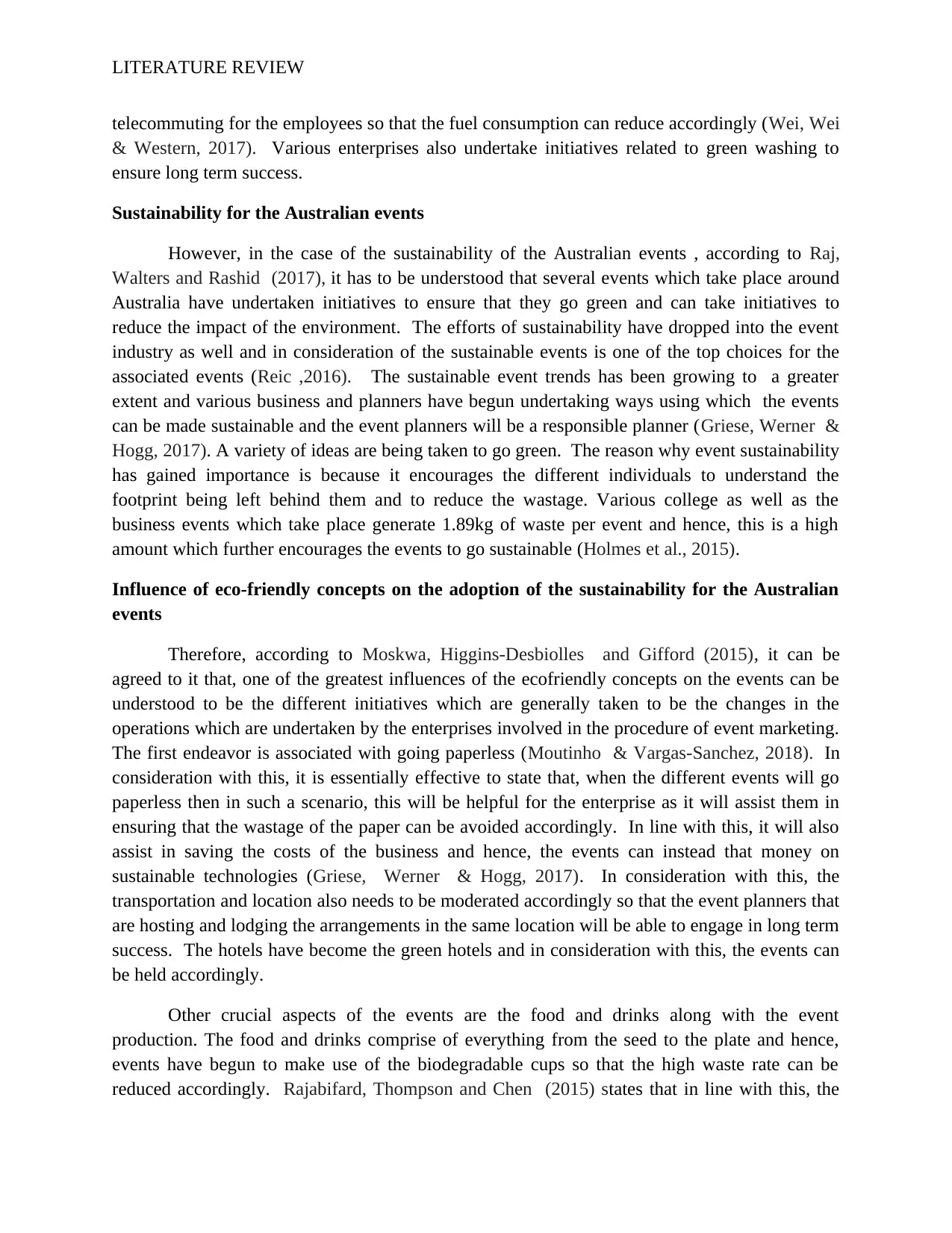
LITERATURE REVIEW
telecommuting for the employees so that the fuel consumption can reduce accordingly (Wei, Wei
& Western, 2017). Various enterprises also undertake initiatives related to green washing to
ensure long term success.
Sustainability for the Australian events
However, in the case of the sustainability of the Australian events , according to Raj,
Walters and Rashid (2017), it has to be understood that several events which take place around
Australia have undertaken initiatives to ensure that they go green and can take initiatives to
reduce the impact of the environment. The efforts of sustainability have dropped into the event
industry as well and in consideration of the sustainable events is one of the top choices for the
associated events (Reic ,2016). The sustainable event trends has been growing to a greater
extent and various business and planners have begun undertaking ways using which the events
can be made sustainable and the event planners will be a responsible planner (Griese, Werner &
Hogg, 2017). A variety of ideas are being taken to go green. The reason why event sustainability
has gained importance is because it encourages the different individuals to understand the
footprint being left behind them and to reduce the wastage. Various college as well as the
business events which take place generate 1.89kg of waste per event and hence, this is a high
amount which further encourages the events to go sustainable (Holmes et al., 2015).
Influence of eco-friendly concepts on the adoption of the sustainability for the Australian
events
Therefore, according to Moskwa, Higgins-Desbiolles and Gifford (2015), it can be
agreed to it that, one of the greatest influences of the ecofriendly concepts on the events can be
understood to be the different initiatives which are generally taken to be the changes in the
operations which are undertaken by the enterprises involved in the procedure of event marketing.
The first endeavor is associated with going paperless (Moutinho & Vargas-Sanchez, 2018). In
consideration with this, it is essentially effective to state that, when the different events will go
paperless then in such a scenario, this will be helpful for the enterprise as it will assist them in
ensuring that the wastage of the paper can be avoided accordingly. In line with this, it will also
assist in saving the costs of the business and hence, the events can instead that money on
sustainable technologies (Griese, Werner & Hogg, 2017). In consideration with this, the
transportation and location also needs to be moderated accordingly so that the event planners that
are hosting and lodging the arrangements in the same location will be able to engage in long term
success. The hotels have become the green hotels and in consideration with this, the events can
be held accordingly.
Other crucial aspects of the events are the food and drinks along with the event
production. The food and drinks comprise of everything from the seed to the plate and hence,
events have begun to make use of the biodegradable cups so that the high waste rate can be
reduced accordingly. Rajabifard, Thompson and Chen (2015) states that in line with this, the
telecommuting for the employees so that the fuel consumption can reduce accordingly (Wei, Wei
& Western, 2017). Various enterprises also undertake initiatives related to green washing to
ensure long term success.
Sustainability for the Australian events
However, in the case of the sustainability of the Australian events , according to Raj,
Walters and Rashid (2017), it has to be understood that several events which take place around
Australia have undertaken initiatives to ensure that they go green and can take initiatives to
reduce the impact of the environment. The efforts of sustainability have dropped into the event
industry as well and in consideration of the sustainable events is one of the top choices for the
associated events (Reic ,2016). The sustainable event trends has been growing to a greater
extent and various business and planners have begun undertaking ways using which the events
can be made sustainable and the event planners will be a responsible planner (Griese, Werner &
Hogg, 2017). A variety of ideas are being taken to go green. The reason why event sustainability
has gained importance is because it encourages the different individuals to understand the
footprint being left behind them and to reduce the wastage. Various college as well as the
business events which take place generate 1.89kg of waste per event and hence, this is a high
amount which further encourages the events to go sustainable (Holmes et al., 2015).
Influence of eco-friendly concepts on the adoption of the sustainability for the Australian
events
Therefore, according to Moskwa, Higgins-Desbiolles and Gifford (2015), it can be
agreed to it that, one of the greatest influences of the ecofriendly concepts on the events can be
understood to be the different initiatives which are generally taken to be the changes in the
operations which are undertaken by the enterprises involved in the procedure of event marketing.
The first endeavor is associated with going paperless (Moutinho & Vargas-Sanchez, 2018). In
consideration with this, it is essentially effective to state that, when the different events will go
paperless then in such a scenario, this will be helpful for the enterprise as it will assist them in
ensuring that the wastage of the paper can be avoided accordingly. In line with this, it will also
assist in saving the costs of the business and hence, the events can instead that money on
sustainable technologies (Griese, Werner & Hogg, 2017). In consideration with this, the
transportation and location also needs to be moderated accordingly so that the event planners that
are hosting and lodging the arrangements in the same location will be able to engage in long term
success. The hotels have become the green hotels and in consideration with this, the events can
be held accordingly.
Other crucial aspects of the events are the food and drinks along with the event
production. The food and drinks comprise of everything from the seed to the plate and hence,
events have begun to make use of the biodegradable cups so that the high waste rate can be
reduced accordingly. Rajabifard, Thompson and Chen (2015) states that in line with this, the
⊘ This is a preview!⊘
Do you want full access?
Subscribe today to unlock all pages.

Trusted by 1+ million students worldwide
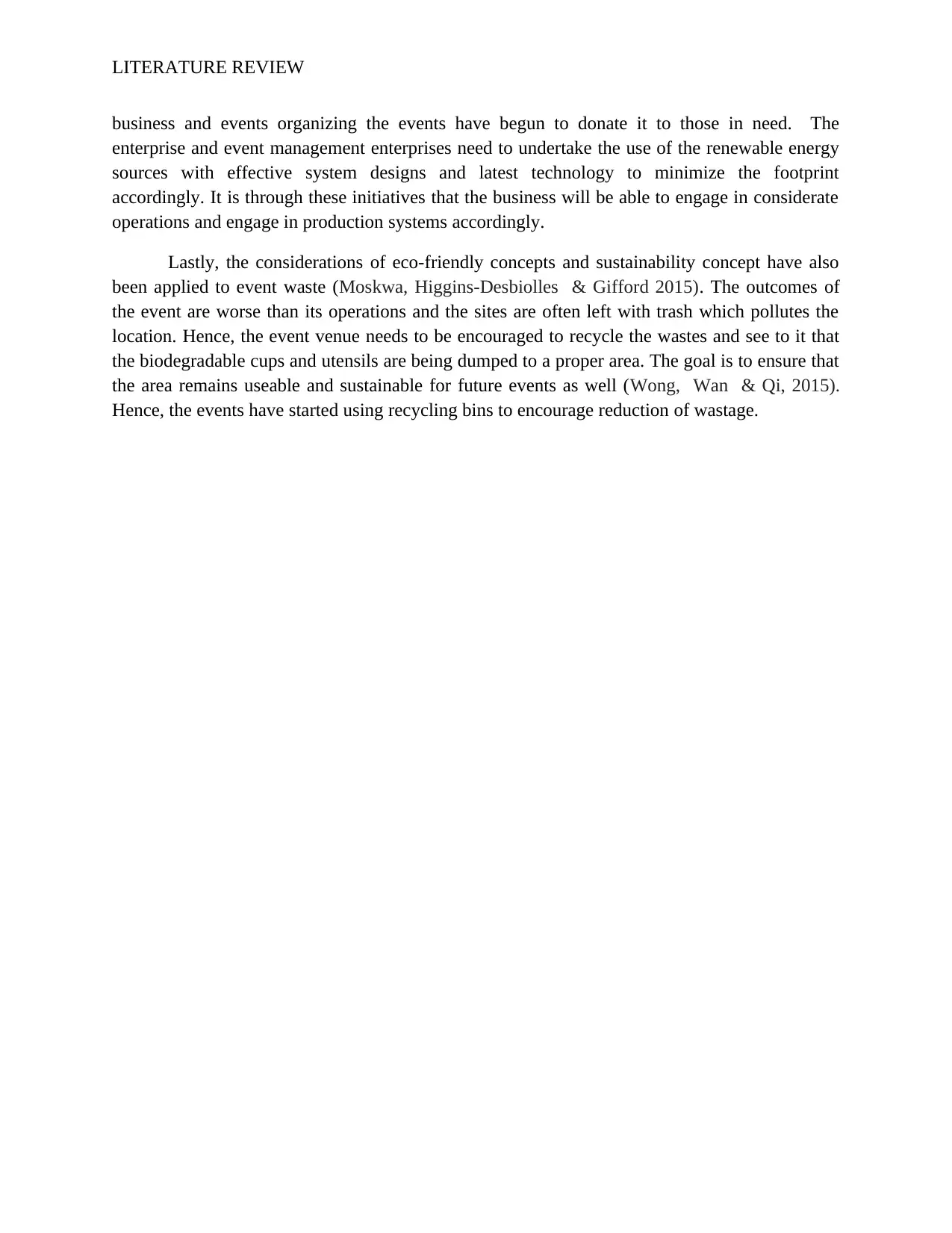
LITERATURE REVIEW
business and events organizing the events have begun to donate it to those in need. The
enterprise and event management enterprises need to undertake the use of the renewable energy
sources with effective system designs and latest technology to minimize the footprint
accordingly. It is through these initiatives that the business will be able to engage in considerate
operations and engage in production systems accordingly.
Lastly, the considerations of eco-friendly concepts and sustainability concept have also
been applied to event waste (Moskwa, Higgins-Desbiolles & Gifford 2015). The outcomes of
the event are worse than its operations and the sites are often left with trash which pollutes the
location. Hence, the event venue needs to be encouraged to recycle the wastes and see to it that
the biodegradable cups and utensils are being dumped to a proper area. The goal is to ensure that
the area remains useable and sustainable for future events as well (Wong, Wan & Qi, 2015).
Hence, the events have started using recycling bins to encourage reduction of wastage.
business and events organizing the events have begun to donate it to those in need. The
enterprise and event management enterprises need to undertake the use of the renewable energy
sources with effective system designs and latest technology to minimize the footprint
accordingly. It is through these initiatives that the business will be able to engage in considerate
operations and engage in production systems accordingly.
Lastly, the considerations of eco-friendly concepts and sustainability concept have also
been applied to event waste (Moskwa, Higgins-Desbiolles & Gifford 2015). The outcomes of
the event are worse than its operations and the sites are often left with trash which pollutes the
location. Hence, the event venue needs to be encouraged to recycle the wastes and see to it that
the biodegradable cups and utensils are being dumped to a proper area. The goal is to ensure that
the area remains useable and sustainable for future events as well (Wong, Wan & Qi, 2015).
Hence, the events have started using recycling bins to encourage reduction of wastage.
Paraphrase This Document
Need a fresh take? Get an instant paraphrase of this document with our AI Paraphraser
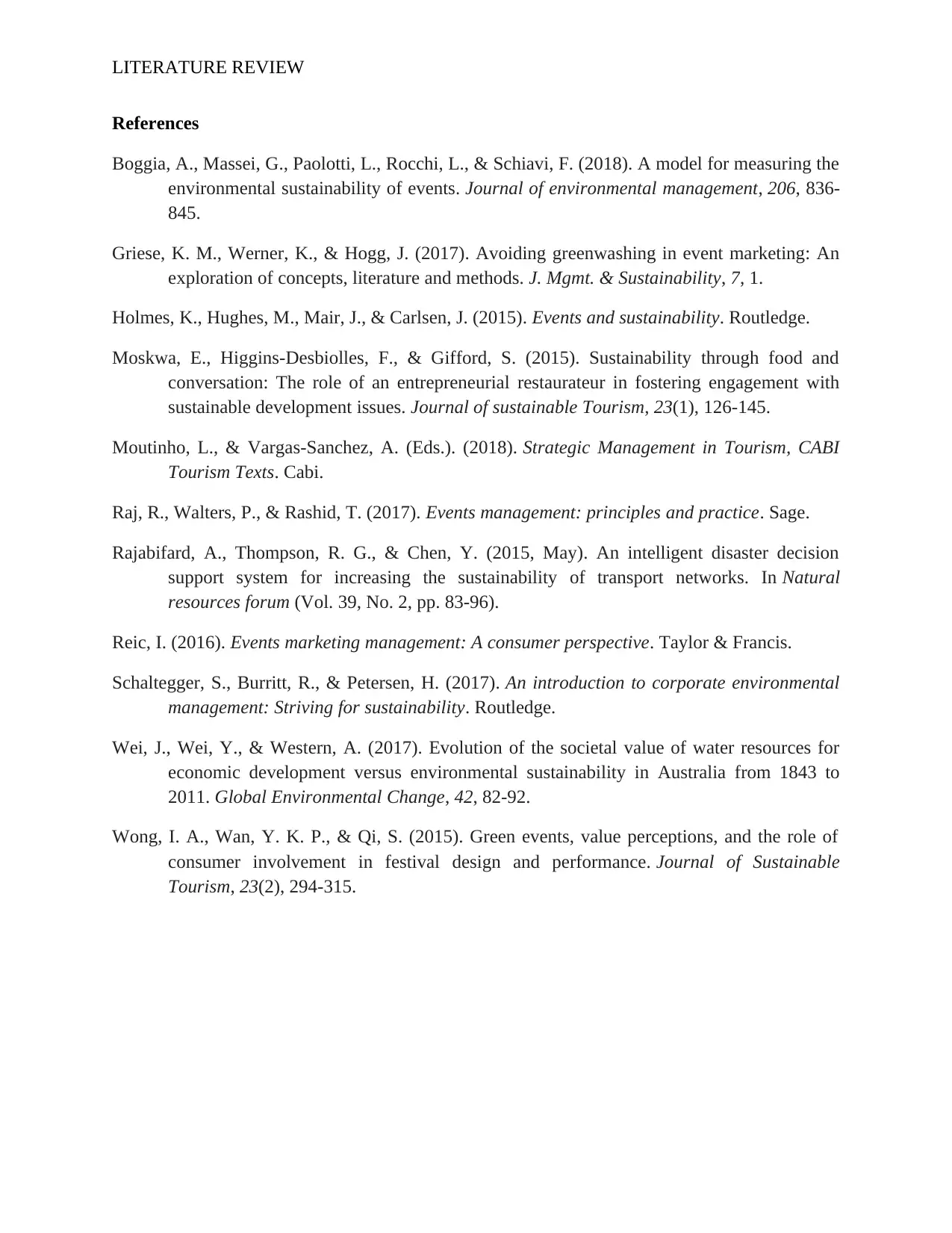
LITERATURE REVIEW
References
Boggia, A., Massei, G., Paolotti, L., Rocchi, L., & Schiavi, F. (2018). A model for measuring the
environmental sustainability of events. Journal of environmental management, 206, 836-
845.
Griese, K. M., Werner, K., & Hogg, J. (2017). Avoiding greenwashing in event marketing: An
exploration of concepts, literature and methods. J. Mgmt. & Sustainability, 7, 1.
Holmes, K., Hughes, M., Mair, J., & Carlsen, J. (2015). Events and sustainability. Routledge.
Moskwa, E., Higgins-Desbiolles, F., & Gifford, S. (2015). Sustainability through food and
conversation: The role of an entrepreneurial restaurateur in fostering engagement with
sustainable development issues. Journal of sustainable Tourism, 23(1), 126-145.
Moutinho, L., & Vargas-Sanchez, A. (Eds.). (2018). Strategic Management in Tourism, CABI
Tourism Texts. Cabi.
Raj, R., Walters, P., & Rashid, T. (2017). Events management: principles and practice. Sage.
Rajabifard, A., Thompson, R. G., & Chen, Y. (2015, May). An intelligent disaster decision
support system for increasing the sustainability of transport networks. In Natural
resources forum (Vol. 39, No. 2, pp. 83-96).
Reic, I. (2016). Events marketing management: A consumer perspective. Taylor & Francis.
Schaltegger, S., Burritt, R., & Petersen, H. (2017). An introduction to corporate environmental
management: Striving for sustainability. Routledge.
Wei, J., Wei, Y., & Western, A. (2017). Evolution of the societal value of water resources for
economic development versus environmental sustainability in Australia from 1843 to
2011. Global Environmental Change, 42, 82-92.
Wong, I. A., Wan, Y. K. P., & Qi, S. (2015). Green events, value perceptions, and the role of
consumer involvement in festival design and performance. Journal of Sustainable
Tourism, 23(2), 294-315.
References
Boggia, A., Massei, G., Paolotti, L., Rocchi, L., & Schiavi, F. (2018). A model for measuring the
environmental sustainability of events. Journal of environmental management, 206, 836-
845.
Griese, K. M., Werner, K., & Hogg, J. (2017). Avoiding greenwashing in event marketing: An
exploration of concepts, literature and methods. J. Mgmt. & Sustainability, 7, 1.
Holmes, K., Hughes, M., Mair, J., & Carlsen, J. (2015). Events and sustainability. Routledge.
Moskwa, E., Higgins-Desbiolles, F., & Gifford, S. (2015). Sustainability through food and
conversation: The role of an entrepreneurial restaurateur in fostering engagement with
sustainable development issues. Journal of sustainable Tourism, 23(1), 126-145.
Moutinho, L., & Vargas-Sanchez, A. (Eds.). (2018). Strategic Management in Tourism, CABI
Tourism Texts. Cabi.
Raj, R., Walters, P., & Rashid, T. (2017). Events management: principles and practice. Sage.
Rajabifard, A., Thompson, R. G., & Chen, Y. (2015, May). An intelligent disaster decision
support system for increasing the sustainability of transport networks. In Natural
resources forum (Vol. 39, No. 2, pp. 83-96).
Reic, I. (2016). Events marketing management: A consumer perspective. Taylor & Francis.
Schaltegger, S., Burritt, R., & Petersen, H. (2017). An introduction to corporate environmental
management: Striving for sustainability. Routledge.
Wei, J., Wei, Y., & Western, A. (2017). Evolution of the societal value of water resources for
economic development versus environmental sustainability in Australia from 1843 to
2011. Global Environmental Change, 42, 82-92.
Wong, I. A., Wan, Y. K. P., & Qi, S. (2015). Green events, value perceptions, and the role of
consumer involvement in festival design and performance. Journal of Sustainable
Tourism, 23(2), 294-315.
1 out of 5
Related Documents
Your All-in-One AI-Powered Toolkit for Academic Success.
+13062052269
info@desklib.com
Available 24*7 on WhatsApp / Email
![[object Object]](/_next/static/media/star-bottom.7253800d.svg)
Unlock your academic potential
Copyright © 2020–2026 A2Z Services. All Rights Reserved. Developed and managed by ZUCOL.




